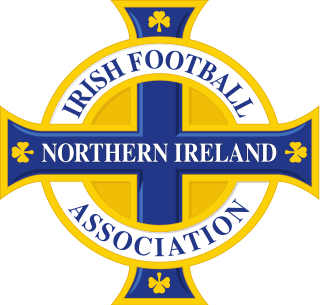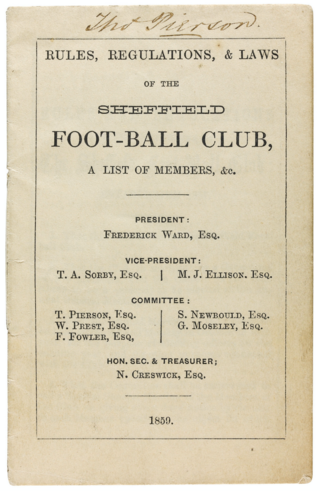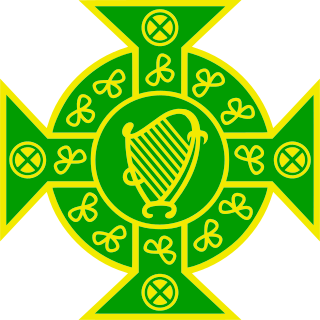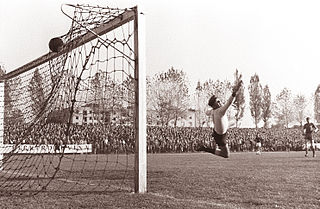
The International Football Conference was a meeting of the four football associations of the Home Nations.

The International Football Conference was a meeting of the four football associations of the Home Nations.
England's Football Association (The FA), the Scottish Football Association (SFA), the Football Association of Wales (FAW) and the Irish Football Association (IFA) met at the Queen's Hotel, Manchester, on 6 December 1882. [1] [2] A precursor to the International Football Association Board, the meeting's major purpose was to address inconsistencies between the laws of the various associations, particularly between England and Scotland.
Among the changes resulting from the conference were:
The new laws were used in the international matches of the 1882–83 season (with the exception of the first, England v. Wales, which still used the old rules). [3] They took general effect in the Laws of the Game at the beginning of the 1883–84 season. [4]

Offside is one of the laws in association football, codified in Law 11 of the Laws of the Game. The law states that a player is in an offside position if any of their body parts are in the opponents' half of the pitch, and closer to the opponent's goal line than both the ball and the second-last opponent.

The Northern Ireland national football team represents Northern Ireland in men's international association football. From 1882 to 1950, all of Ireland was represented by a single side, the Ireland national football team, organised by the Irish Football Association (IFA). In 1921, the jurisdiction of the IFA was reduced to Northern Ireland following the secession of clubs in the soon-to-be Irish Free State, although its team remained the national team for all of Ireland until 1950, and used the name Ireland until the 1970s. The Football Association of Ireland (FAI) organises the separate Republic of Ireland national football team.

The Irish Football Association (IFA) is the governing body for association football in Northern Ireland. It organised the Ireland national football team from 1880 to 1950, which after 1954, became the Northern Ireland national football team.
The International Football Association Board (IFAB) is an international self-regulatory body of association football that is known for determining the Laws of the Game, the regulations for the gameplay of football. It was founded in 1886 in order to establish standardised regulations or "Laws" for the gameplay of international competition, and has since acted as the primary maintainer ("Guardian") of these Laws. FIFA, a prominent governing body for football, has recognised IFAB's jurisdiction over its Laws since its establishment in 1904.
The Laws of the Game are the codified rules of association football. The laws mention the number of players a team should have, the game length, the size of the field and ball, the type and nature of fouls that referees may penalise, the offside law, and many other laws that define the sport. During a match, it is the task of the referee to interpret and enforce the Laws of the Game.
Football is the most popular sport in the United Kingdom. Football is organised on a separate basis in each of the four constituent countries, England, Scotland, Wales, and Northern Ireland, that make up the United Kingdom (UK), with each having a national football association responsible for the overall management of football within their respective country. There is no United Kingdom national football team. Football has been the most popular sport in the UK since the 1860s. Rugby union, rugby league and cricket are other popular sports.

A throw-in is a method of restarting play in a game of association football when the whole of ball passes over the touchline. It is governed by Law 15 of the Laws of the Game. In Scotland it is known as a shy.

The Sheffield Rules was a code of football devised and played in the English city of Sheffield between 1858 and 1877. The rules were initially created and revised by Sheffield Football Club, with responsibility for the laws passing to the Sheffield Football Association upon that body's creation in 1867. The rules spread beyond the city boundaries to other clubs and associations in the north and midlands of England, making them one of the most popular forms of football during the 1860s and 1870s.
The following are events in the 1850s decade which are relevant to the development of association football. Included are events in closely related codes, such as the Sheffield Rules. All events happened in English football unless specified otherwise.
The following are events in the 1860s decade which are relevant to the development of association football. Included are events in closely related codes, such as the Sheffield Rules. All events happened in English football unless specified otherwise.

The Ireland national football team represented the island of Ireland in association football from 1882 until 1950. It was organised by the Irish Football Association (IFA), and is the fourth oldest international team in the world. It mainly played in the British Home Championship against England, Scotland and Wales. Though often vying with Wales to avoid the wooden spoon, Ireland won the Championship in 1914, and shared it with England and Scotland in 1903.
The 1884 FA Cup final was a football match between Blackburn Rovers and Queen's Park contested on 29 March 1884 at the Kennington Oval. It was the showpiece match of English football's primary cup competition, the Football Association Challenge Cup, it was the 13th Cup final. It was the first time that a Scottish team reached the final of the tournament, with Queen's Park knocking out the previous holders of the trophy en route.
1949–50 British Home Championship was one of the most significant competitions of the British Home Championship football tournament. This year saw the competition doubling up as Group 1 in the qualifying rounds for the 1950 FIFA World Cup. It was the first time that either England, Wales, Scotland or Ireland (IFA) had entered a World Cup competition. It was also a significant moment in the history of Irish football as it was the last time that the (Northern) Irish Football Association entered a team featuring players born in both Northern Ireland and what is now the Republic of Ireland.

This is a list of the Ireland national football team results from 1882 to 1899. From 1882 to 1921 all of Ireland was represented by a single side, the Ireland national football team, organised by the Irish Football Association (IFA).
The 1873–74 Scottish Cup – officially the Scottish Football Association Challenge Cup – was the first season of Scotland's most prestigious football knockout competition. A total of 16 teams from the west of Scotland entered the competition, but only 14 played a match after two teams withdrew. The competition began with a match between Renton and Kilmarnock on 18 October 1873 and concluded with the final on 21 March 1874. After 16 matches and 38 goals, the inaugural cup was won by Queen's Park who defeated fellow Glasgow club Clydesdale 2–0 in the final.
In association football, the FIFA eligibility rules are the eligibility criteria established by FIFA, the sport's governing body, to facilitate the selection of representative teams for international competitions. Specifically, FIFA maintains and implements rules determining a player's eligibility to represent a particular national team in officially sanctioned international competitions and friendly matches.
The 1883–84 season was the 11th Scottish football season in which Dumbarton competed at a national level.

In games of association football, teams compete to score the most goals. A goal is scored when the ball passes completely over a goal line at either end of the field of play between two centrally positioned upright goal posts 24 feet (7.32 m) apart and underneath a horizontal crossbar at a height of 8 feet (2.44 m) — this frame is itself referred to as a goal. Each team aims to score at one end of the pitch, while preventing their opponents from scoring at the other end. Nets are usually attached to the goal frame to catch goalscoring balls, but the ball is not required to touch the net.

The Northern Ireland national football team represents Northern Ireland in international association football. From 1882 to 1921 all of Ireland was represented by a single side, the Ireland national football team, organised by the Irish Football Association (IFA).

The Northern Ireland national football team represents Northern Ireland in international association football. From 1882 to 1921 all of Ireland was represented by a single side, the Ireland national football team, organised by the Irish Football Association (IFA).